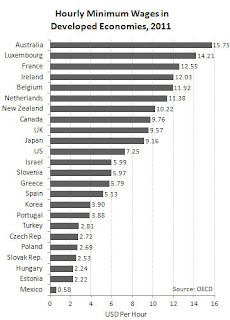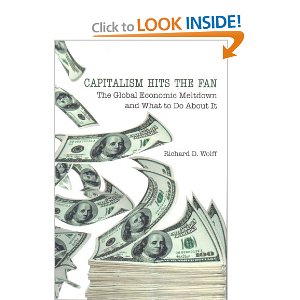.jpg) |
| Serge Melki/Wikimedia Commons |
 |
| OECD Statistics |
"the inflation-adjusted value of the (proposed) minimum wage would still be more than two percent lower than it had been in the late 1960s...." , and that
"If workers at the bottom had continued to share in the economy's growth in the years since 1968 as they had in the three decades before 1968, we would be looking at a very different economy and society. If the minimum wage had risen in step with productivity growth it would be over $16.50 an hour today.That is higher than the hourly wages earned by 40 percent of men and half of women."
From Baker's analysis it appears that in the last 50 years (!) workers at the lower income levels in the U.S. have not benefited at all from economic growth and productivity increase. For those of us, who have followed the news in recent years, this is not surprising. Income inequality in the U.S. has reached record highs; since 2009 the top 1% has increased its income by 11% while the rest of the country has seen lower income levels; banks, which were at least partially responsible for the economic crisis, had to be bailed out by tax payers while their executives kept receiving bonuses; even though the stock market has recovered, unemployment figures are still high; cities like Detroit are facing financial troubles and possibly even bankruptcy; the postal services are under pressure and have to reduce their services, and the list goes on. So, again, is the minimum wage and the other developments in the U.S. - and to a lesser extent in the Western-European economies - symptomatic for an economic system in crisis? Listen to what economist Richard D. Wolff, Professor of Economics Emeritus, University of Massachusetts, Amherst and author of Capitalism Hits the Fan: The Global Economic Meltdown and What to Do About It says about capitalism as a system run wild in an interview with Bill Moyers in his weekly Moyers & Company program on PBS. Not only thought provoking, but also noteworthy for expressing critical views very rarely broadcasted on the U.S. networks.
For further reading:
 |
| Capitalism Hits the Fan |
No comments:
Post a Comment